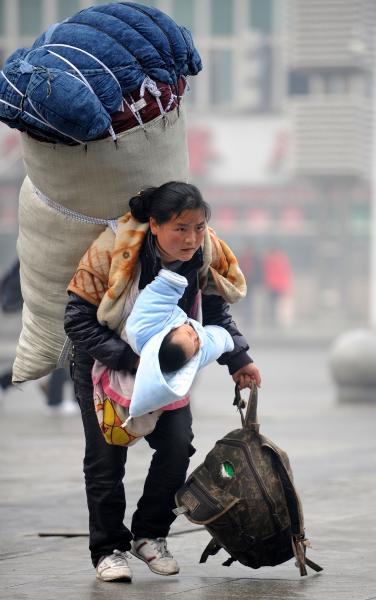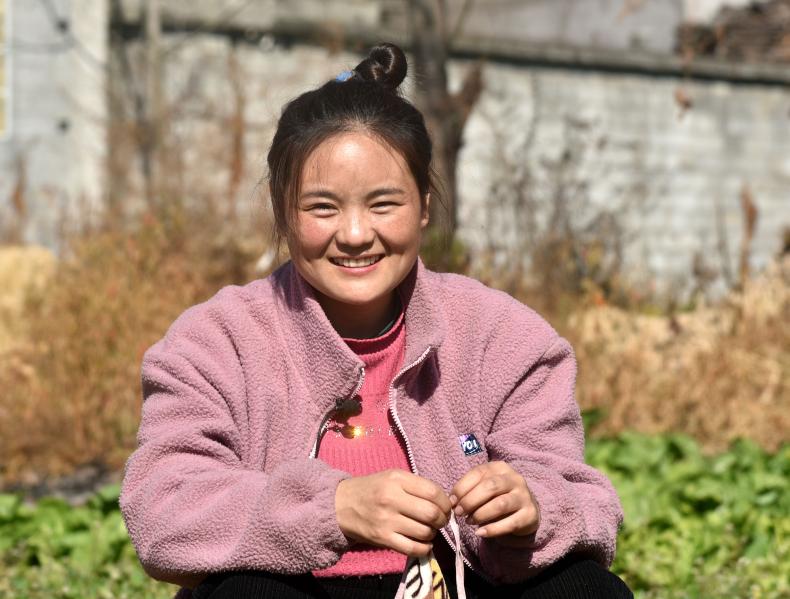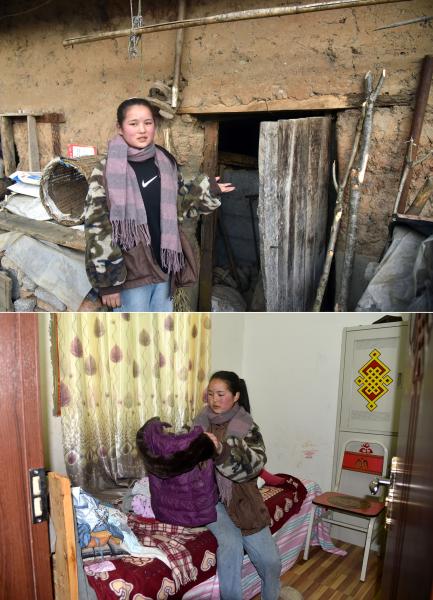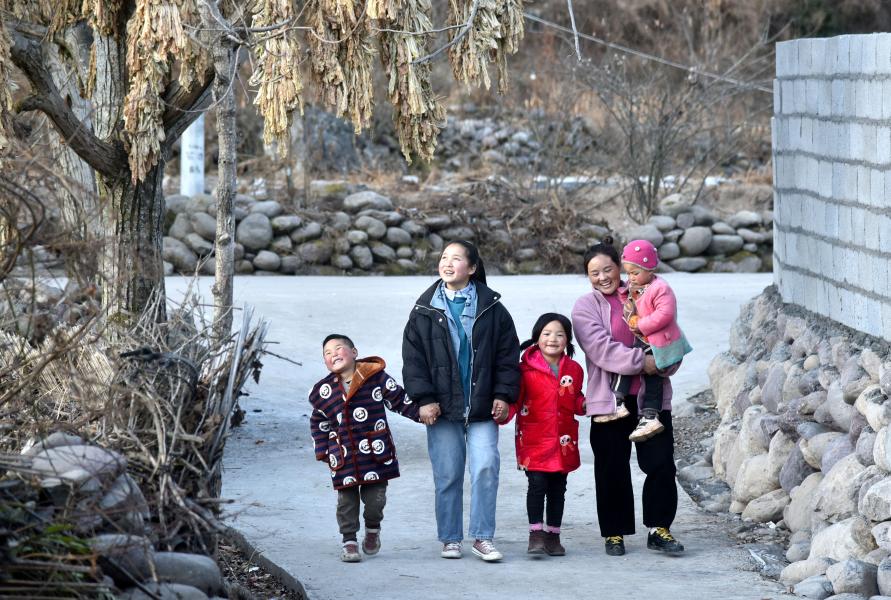-- During the Spring Festival travel rush in 2010, a photo went viral on China's Internet showing a migrant-worker mother weighed down with heavy luggage while holding a baby in her arm.
-- After an 11-year search, the photographer once again met the mother in her hometown in Sichuan Province.
-- Now living in her new house, Bamu Yubumu recalled the grinding poverty and hardship behind the 2010 photo, and how China's historic poverty alleviation campaign changed her fate in the following years.

Bamu Yubumu trudges toward the Nanchang Railway Station in Nanchang, east China's Jiangxi Province, Jan. 30, 2010. (Xinhua/Zhou Ke)
by Xinhua Writers Liu Jie, Zhou Ke, Li Yue and Yao Yuan
BEIJING, Feb. 4 (Xinhua) -- On Jan. 30, 2010, the first day of the year's "Chunyun," or Spring Festival travel rush, a young mother trudged toward a railway station, a large sack bulging with daily necessities on her back, a battered bag in her left hand, and a baby clasped in her right arm.
Xinhua correspondent Zhou Ke captured the moment at the Nanchang Railway Station in Nanchang, east China's Jiangxi Province. Titled "Baby, Mama Takes You Home," the photo quickly went viral on the Internet.
Though the young lady was weighed down with her heavy baggage, her determined eyes pulled at the heartstrings of countless people and later became the motherly face of the annual Chunyun, when hundreds of millions of Chinese people travel back to their hometowns for Lunar New Year family reunions.
The viral picture sent Zhou on a search for the mother, who had not left her contact information. After showing the picture to countless interviewees, last month, the correspondent found Bamu Yubumu in her hometown -- Yuexi County in Liangshan Yi Autonomous Prefecture, in southwest China's Sichuan Province.

Bamu Yubumu is interviewed by Xinhua in Liangshan Yi Autonomous Prefecture, southwest China's Sichuan Province, on Jan. 22, 2021. (Xinhua/Zhou Ke)
"We were hard up, so I traveled to work to help with family expenses," said the 32-year-old woman who belongs to the Yi ethnic group, recalling that the photo was taken as she was hurrying to return home after working in Nanchang for five months.
She vividly remembers the hardship of that journey, which lasted three days and two nights and included trains and buses. The young mother packed bread, instant noodles, baby diapers and even quilts into her bag, which was so large that many kind-hearted passengers offered to help her carry the load.
Bamu's hometown was in one of the areas considered most difficult for the country's poverty alleviation campaign due to its harsh natural environment.
Extreme poverty once forced many local women of previous generations to be betrothed upon birth, married at the age of 16 or 17, and to spend the rest of their lives farming and caring for the family.
Bamu said her childhood memories all involved mountains. She did not have the opportunity to go to school, but was hopeful that her children would enjoy a better life. She decided to join the legion of migrant workers seeking better-paying jobs in cities.
In Nanchang, Bamu worked in a brick factory, earning some 500 yuan (about 73 U.S. dollars) a month. She said the salary was not high, but it could help her create a better situation for her children.

In this combo photo taken on Jan. 20, 2021, the upper part shows Wuqi Labumu, eldest daughter of Bamu Yubumu, introducing an old house where she used to live; the lower part shows Wuqi Labumu arranging her clothes in her new residence. (Xinhua/Zhou Ke)
More changes awaited Bamu after she returned home in 2010. Under the guideline on targeted poverty alleviation, which demands local authorities to tailor relief measures to local conditions, more villagers started planting more profitable tobacco leaves and other cash crops, which also brought new hope to Bamu and her husband.
Bamu's family had grown corn, buckwheat and potato for generations on 0.4 hectares of land.
Eligible to register as impoverished, Bamu's family was assigned specific support providers, including officials and an agricultural technician, under whose guidance they began to plant tobacco.
From trials to large-scale planting, their efforts came to fruition. In 2020, Bamu's family was no longer on the poverty list, with their annual income reaching 100,000 yuan.
Moving into a house with a reinforced concrete structure, built under government subsidies, was one of the most marked changes in Bamu's life.
"Living in a house like this, which can keep the rainwater from leaking into the room, is what I had dreamed of since childhood," Bamu said. She had lived in an adobe house for 30 years before her move.
According to the government of Yuexi County, about 82,000 destitute families have been relocated into new houses and gained access to electricity, tap water and hardened roads, thanks to targeted poverty-relief efforts over the past eight years.

Bamu Yubumu walks with her children on a newly paved concrete road in Taoyuan Village on Jan. 22, 2021. (Xinhua/Zhou Ke)
Due to a lack of medical resources in her hometown, Bamu lost two children to illness, including the one in the viral photo. However, every village in the county has a clinic now, and villagers only have to pay a small fragment of their medical bills after China expanded the coverage of its basic medical insurance.
Her family also received financial support for health care and education. All four of her children are receiving proper education in school.
At a junior high school in Yuexi County, the number of students has grown from 873 in 2015 to 2,425 this year, with the proportion of girls increasing from 15 percent to 51 percent.
In 2018, Bamu's village, Taoyuan, built cement roads. Students can now walk to school in mere minutes, rather than having to trudge along rugged mountain roads for hours.
More than 700 million people like Bamu have been lifted out of poverty in China over the past 40-plus years of reform and opening-up, contributing more than 70 percent of global poverty reduction.
With China's infrastructure boom and greatly improved rural living conditions, the sight of a young migrant mother struggling with bulky baggage is no longer common during the Spring Festival travel rush.
Bamu's journey back home, which once took three days, has been shortened to 14 hours, thanks to high-speed railways and other infrastructure upgrades.
"Back then I never expected a life as I have today," said a smiling Bamu. "So no matter how hard life gets, we must be undeterred and move on."
(Video reporters: Zhou Ke, Li Sijia; video editor: Luo Hui) ■




